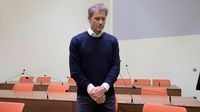Former German national goalkeeper Jens Lehmann faced the Munich District Court on April 3, 2025, for a case stemming from a drunken driving incident after attending the Oktoberfest. The court ruled that while Lehmann's actions were indeed irresponsible, they constituted a negligent administrative offense rather than a criminal act.
On the night of September 23, 2024, police stopped Lehmann, 55, around 1:30 AM after observing him driving erratically. According to the police report, he had swerved onto a parking strip without reason and had difficulty maintaining his balance when asked to show his first aid kit and warning triangle.
Lehmann admitted in court, "It was a mistake that I drove." He explained that he had consumed two Maß beers and a 'Saures' (a beer mixed with water) during his time at the Schützenfestzelt starting at 5:30 PM. He claimed that his decision to drive was based on a misjudgment of his fitness to do so.
The police noted a strong smell of alcohol upon approaching Lehmann's vehicle, and during the subsequent checks, they reported that he exhibited signs of intoxication, including swaying and difficulty articulating his thoughts. However, Lehmann vehemently denied being drunk, asserting, "I swear on my children" that he was telling the truth.
During the trial, a police officer testified that Lehmann had exited his vehicle without prompting and struggled to locate essential safety equipment. The officer recalled, "He was holding onto the tailgate, which seemed strange to us." Lehmann later claimed he was simply trying to open the trunk.
Despite the officers' observations, the court ultimately ruled that Lehmann's behavior could not be solely attributed to alcohol consumption. Judge Alexandra Möhring stated, "You would have behaved similarly even when sober," suggesting that Lehmann's demeanor was consistent with his character rather than his alcohol level.
The blood test taken at the forensics lab revealed a blood alcohol concentration of 0.72 Promille. Although the prosecution initially sought a hefty fine of 72,000 euros for driving under the influence, the court settled on a fine of 1,000 euros and a one-month suspension of his driving privileges, which Lehmann had already served due to a prior confiscation.
Lehmann's attorney criticized the severity of the initial charges, arguing that such offenses typically result in lesser penalties, including a fine of about 500 euros and two points on the driver's license. The judge's decision reflected this sentiment, indicating that the circumstances surrounding Lehmann's actions did not warrant a criminal charge.
In a surprising twist, after the trial, Lehmann was seen taking the subway home, a stark contrast to the earlier events of the night where he had been apprehended for driving under the influence. This public transport choice seemed to symbolize a shift in his circumstances and perhaps a deeper realization of the consequences of his actions.
Lehmann, who has not been a stranger to legal troubles, previously faced a conviction in 2024 for property damage involving a chainsaw. This latest incident has reignited discussions about his behavior and the responsibilities of public figures.
Throughout the proceedings, Lehmann maintained that his behavior was not indicative of intoxication but rather attributed to a cough he had experienced. He remarked, "I don't gag, especially not after two Maß," emphasizing his belief that he was fit to drive.
As the court proceedings concluded, Judge Möhring advised Lehmann to reflect on his conduct, stating, "I don't think it will get you anywhere in the long run." She highlighted the importance of adhering to laws, particularly for someone in his position as a former professional athlete.
The case has sparked conversations about accountability and the influence of alcohol, especially during festive occasions like Oktoberfest. Many are left wondering if this incident will serve as a wake-up call for Lehmann, who has had a tumultuous relationship with the law over the years.
In the wake of this ruling, Lehmann's future remains uncertain, but the court's decision marks a significant moment in his ongoing struggle to navigate the consequences of his actions both on and off the field.







